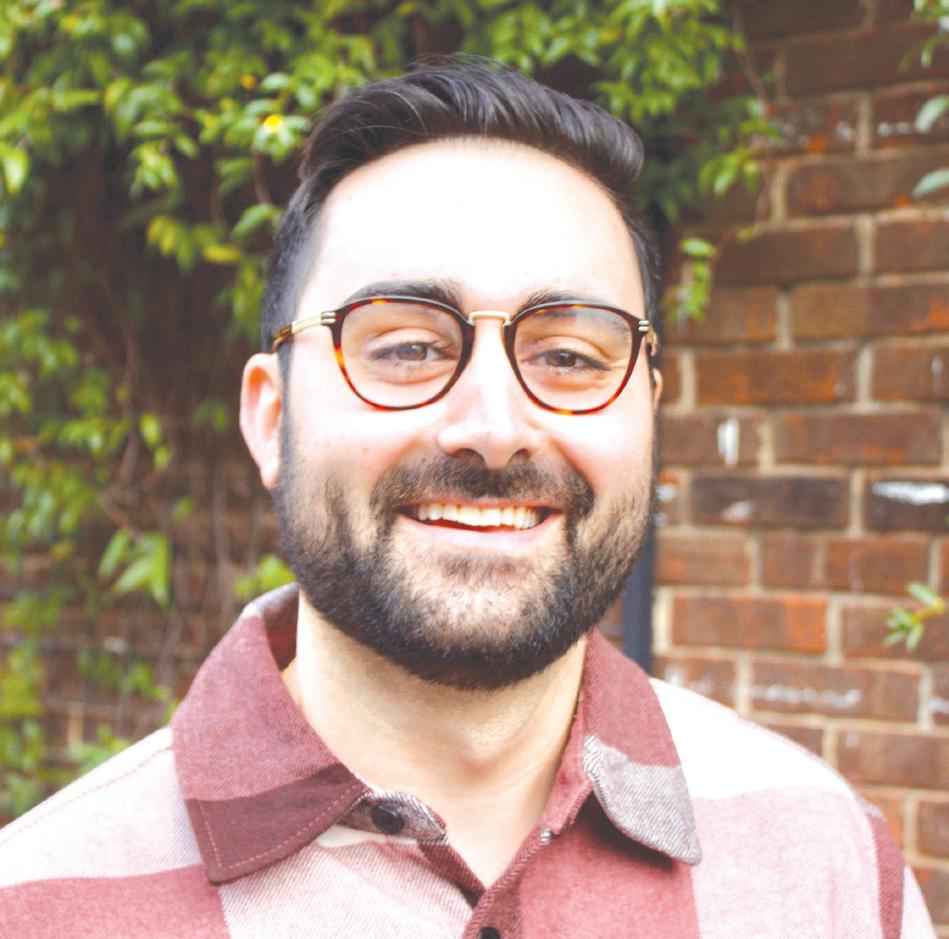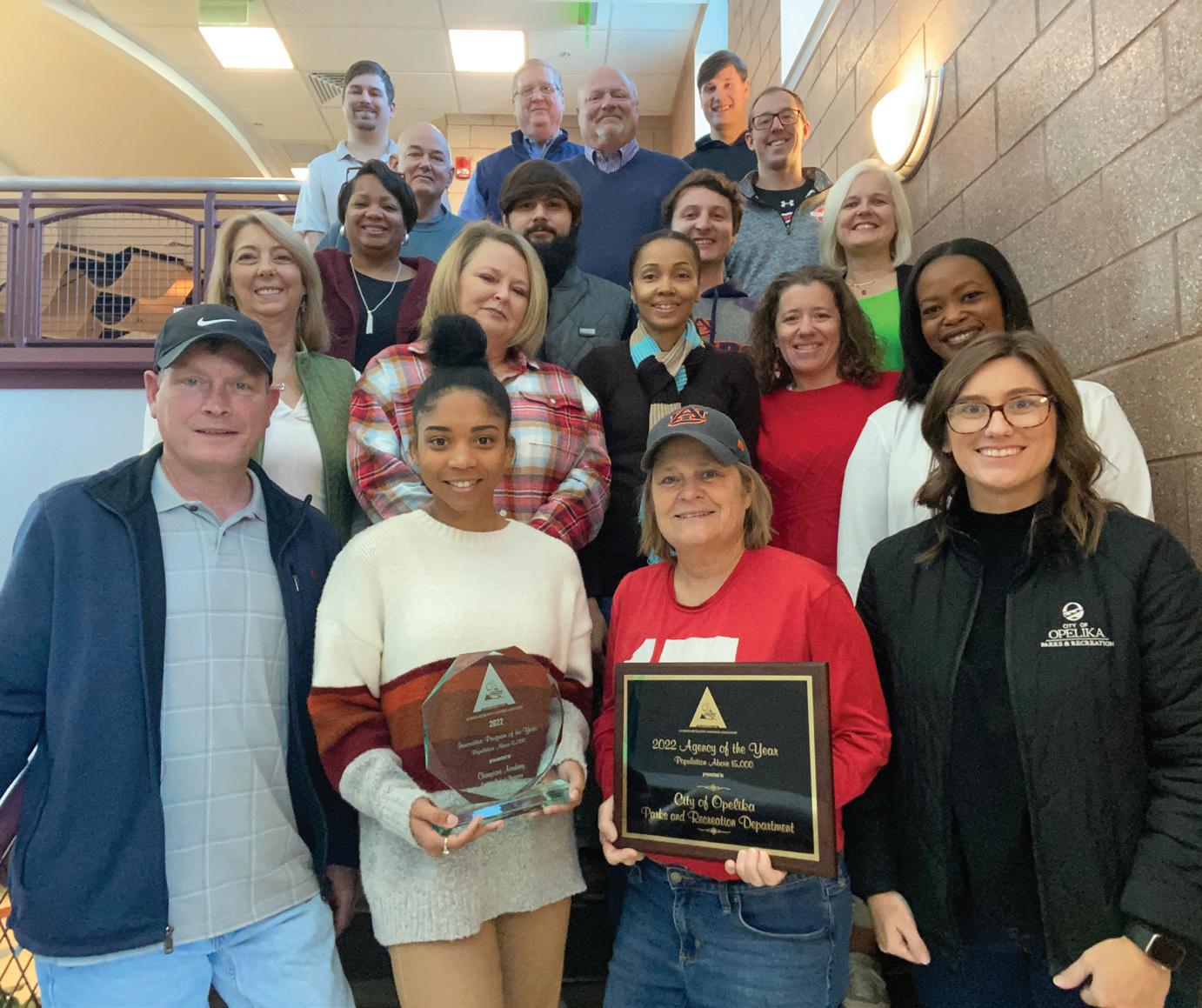
5 minute read
Heroes In Our Midst
A few hours before she was rescued, she and her mother stood on the side of a road, where the mama doe placed her newborn in a safe spot to wait while she foraged for food. A volunteer told me that, when tucked in like this, fawns do not move under any circumstances. Instinct tells them to wait for their mothers to return, no matter what. Plus, fawns can’t really walk until a few hours after they’re born.
I talked in last week’s column about having done some photography in my college years. On one excursion, I found myself in Enterprise, Alabama, at Big Bend Wildlife Sanctuary.
Advertisement
Big Bend was a volunteer organization that rehabilitated injured wildlife. First, I met the owls.
Many of the birds had been shot, some by hunters. One owl was missing a whole wing.
As I walked through each room and met the injured owls, hawks, eagles and others, I encountered some interesting characters. There was the armadillo who struggled to walk on feet that were severely underdeveloped because his previous owner had carried him around in a purse for most of his early life and given him few chances to walk on his own.
Then there was Sue the silver fox, who was the painful product of generations of inbreeding by Russian pelt dealers. She was partially blind and deaf and had severe problems with several internal organs. She was so thoroughly disabled that the owners at Big Bend, John and Terry Morse, who always tried their absolute hardest to help animals get back into the wild, could only get an education permit for Sue and take her to schools to teach students about wildlife preservation.
The protagonist of an amazing story sat resting and healing in the tranquility of every room at Big Bend Wildlife Sanctuary. As I met all of these animals, I was followed by an entourage of wobblylegged fawns chewing on the straps hanging from my camera bag and licking my arms; John and Terry said they love the taste of the salt on our skin.
The fawns were allowed to run around inside and interact with volunteers until they got older and needed to be moved progressively farther into the woods so they would no longer feel comfortable around humans and avoid us like smart deer do.
My posse of saltcrazed fawns, still young enough to prance around inside, followed me into a room where one lay by herself under a bale of hay suspended in a metal cage above her head.
I learned that she was brought to Big Bend when she was only 12 hours old.
“My happiest childhood memories are at Children’s Hospital. Those people love me.”
In her teenage years, things have gotten even tougher. What she misses most is her independence. When you deal with the medical trials Morgan deals with, you’re always under supervision. This gets old, fast.
“I couldn’t do anything on my own,” she said. “Couldn’t even walk the school hallway without nurses hovering around me, waiting for me to have a seizure.”
Morgan wouldn’t sleep by herself, for fear a nighttime seizure would kill her. She wouldn’t eat by herself, for fear that she would choke. She couldn’t drink a bottle of water without someone nearby.
“I was always afraid. Always.”
But her story has a good ending, in as much as Morgan isn’t afraid anymore. Not even a little bit. Because now she has Clarabelle.
Enter Clarabelle. You’re looking at 65 pounds of pure black Lab, seated beside Morgan, wearing a bone-serious face. The dog glances at me now and then, but the animal makes it clear, she’s not here to mess around.
Clarabelle is working. She is constantly monitoring Morgan’s physical body, ready to alert for an oncoming seizure.
“Before Clarabelle, I had no independence. I couldn’t even go to the bathroom by myself. Now, I do everything by myself. I’m a regular kid … sorta.”
Thanks to Service Dogs Alabama, Morgan is independent. To prove it, next semester, Morgan is going away to college. She will be a freshman at UAB. Morgan will live on her own. She will do everything on her own.
Morgan will live the obligatory college life. She will do all things ordinary college kids do: She will spend hours creating TikToks, listen to loud music, eat too much junk food, and waste entire years of her life learning
See DIETRICH, page A5
Tragically, this fawn’s mother was then hit by a car and killed as she bounded across the road. To make matters even worse, the infant fawn watched the car speed off from a few yards away while laying in the worst possible place to have been accidentally stashed by her mother: on top of a fire ant hill.
A little while after the mother doe died, a man drove by, saw the baby fawn being consumed by fire ants, jumped out of his truck, pulled her off the ant hill, set her in the passenger seat and drove her to a veterinary hospital while fire ants swarmed both of them. After delivering the fawn to the haven where she would be treated and saved, he drove himself to the emergency room. Doctors there told him he had roughly 2,000 fire ant bites on his body and that it was a miracle he wasn’t in anaphylactic shock. If you were walking through Walmart and passed by a guy covered head to toe in big red welts, would you figure he must be a hero? My middle school principal
See DICHIARA, page A6
Awards
Innovative Program of the Year. This award honors programs that demonstrate exceptional innovation in design, presentation and implementation in the parks and recreation field.
Covington Area Manager Bobby Nix created Champions Academy to help equip seventh-, eighth- and ninth-grade young men with the character and skills necessary to thrive and contribute to our community.
Additionally, Opelika Parks and Recreation Public Relations Coordinator Laura Leigh Chesser was named president of ARPA. Chesser will
HUNGRY >>
FROM A3 the ability to provide their input about app features and more.
SHARE YOUR TASTE BUDS
Stage 1 of the preview unveils how Beary sets up a person’s Taste Buds. After downloading Beary Hungry Preview from the Apple App Store, users can walk through the Taste Bud setup process, and for fun, Beary will tell them which of the 15 Taste Bud Types their taste buds are most lead the 520-member organization during her one-year term.

“I am excited about the recognitions received by our department at this year’s ARPA State Conference — Laura Leigh Chesser for being elected president of ARPA for 2023 and Bobby Nix for the Innovative Program award,” said Opelika Parks and Recreation Director Sam Bailey.
“It is also a great honor that for the first time ever, the Opelika Parks and Recreation Department was recognized as Agency of the Year in the state of Alabama.”

Opelika’s first Park Board began functioning on May 15, 1946, making the Opelika Parks and like — similar to Spotify Wrapped or the Myers Briggs Personality Test.
More features of the app, including using your Taste Buds to find food, will preview in the coming months. The fully featured app will officially launch later in the year for free in the App Store.
Everyone in or visiting the Opelika/Auburn area with an iPhone or iPad is encouraged to download Beary Hungry Preview to get an insider look at what is to come. Then, for fun, they may share and compare their Taste Buds to see how well their family and friends know their tastes.
Recreation Department one of the oldest municipal recreation departments in the state of Alabama.
Since that time, the department has grown to include 33 full-time employees, 200 parttime employees and 500 volunteers. They provide more than 100 different programs, events and activities each year.
“The Opelika Parks and Recreation Department has been an invaluable member of the Alabama Recreation and Parks Association for more than 30 years,” said Natalie Norman, ARPA executive director. “These awards reflect the tangible difference they are making in their community. We greatly appreciate all that.
Moreover, all restaurants in the community are encouraged to take advantage of early-access pricing for Beary Hungry — a simple and more cost-effective way to bring customers to their door. Restaurants can instantly get their early access discount by texting “HUNGRY” to 833-456-3393 and begin the quick onboarding process.










